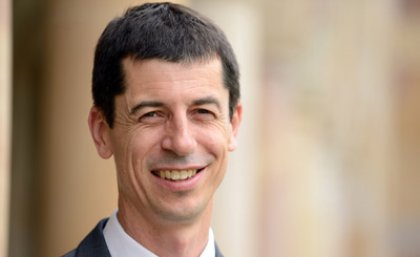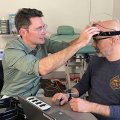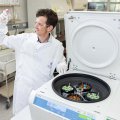
Professor Matt Brown recalls how he became interested in a career in genetics research. It was the late 1980s and the causative gene for cystic fibrosis (CF) had just been discovered. “That discovery, and the blossoming of research into CF and other monogenic diseases, and into human migration using the new genetic information, captivated me.”
Inspired, Brown pursued a degree in medicine at the University of Sydney, and then trained as a physician specialising in rheumatology. However, he became troubled by the inadequacy of existing treatments in rheumatology. This presented a watershed: pursue a clinical career relying on those treatments or discover better treatments.
Choosing the latter, Brown moved to the Wellcome Trust Centre for Human Genetics at the University of Oxford in the UK, where he pursued an MD in the genetics of Ankylosing Spondylitis (AS), with Professor Paul Wordsworth, a renowned British rheumatologist. AS is a form of arthritis that involves chronic inflammation, particularly of the spinal and pelvic joints. The inflammation triggers uncontrolled bone growth, effectively fusing the spine and/or pelvis and causing significant pain and disability.
“I had always been fascinated by AS, a condition for which there were really no treatments at the time, and which had an obvious massive genetic component,” says Brown.
Brown continued his work at Oxford, building a large research group focused on the genetics of common bone and joint diseases. He was appointed Reader then Professor of Musculoskeletal Sciences, and then became a Fellow of the University. During that time, he collaborated extensively on osteoporosis genetics research with Professor John Eisman at the Garvan Institute in Sydney, a mentor who has had an invaluable impact on Brown’s career.
Brown returned to Australia in 2005 to become Professor of Immunogenetics at the University of Queensland Diamantina Institute (UQDI) where he established research programs in the genetics of common diseases, including AS, osteoporosis, rheumatoid arthritis, obesity, cancer and multiple sclerosis. He also became one of the founding investigators of the Wellcome Trust Case-Control Consortium (WTCCC), which developed the genomewide association study (GWAS), a new method for identifying genes in common human diseases that has had a profound influence on genetics.
“Genomewide association studies have identified over 2000 genes for common human diseases and have had a massive impact in virtually all areas of human biomedical research,” Brown explains. With regard to AS, they have identified 13 of the 14 genes known to be involved in the disease. He adds that this has had a significant international effect on AS research and has led to successful trials of new therapeutics.
Brown is now Director of UQDI and continues to expand his research and clinical collaborations.
“I am determined in my research career to develop treatments that end up in clinical practice, so my group has a large arm researching mechanisms by which genetic variants cause disease, and treatments based on that understanding.”
Brown and his colleagues also run a specialist service for AS patients at the adjacent Princess Alexandra Hospital. This allows them to provide excellent clinical service and, in turn, this direct access means they are one of very few groups worldwide able to do functional research directly in AS patients.
Brown believes the main challenge ahead is the need to better understand the biology underlying the genetic associations they have identified, but he is confident this challenge will be met.
“I feel very lucky to have been involved in genetics research at a time when it has absolutely boomed, and every day really fascinating insights about the basic causes of human diseases are being reported. The excitement that this brings is intoxicating, and is one of the major things that drives me to turn up to work each day.”
The opportunity to help outstanding young scientists develop, and being pushed himself to keep up with them is another major incentive, he adds. "Watching them fly is one of the great rewards for group leaders such as myself.”











